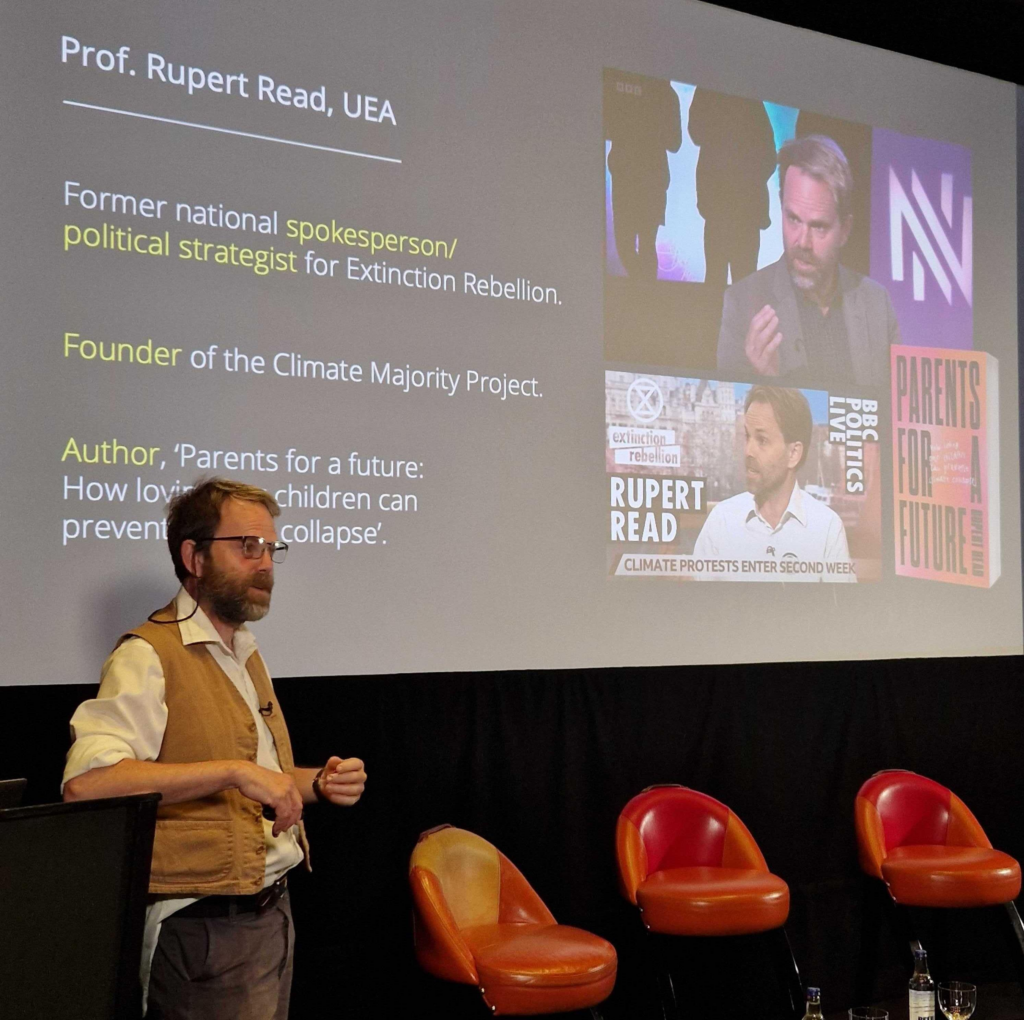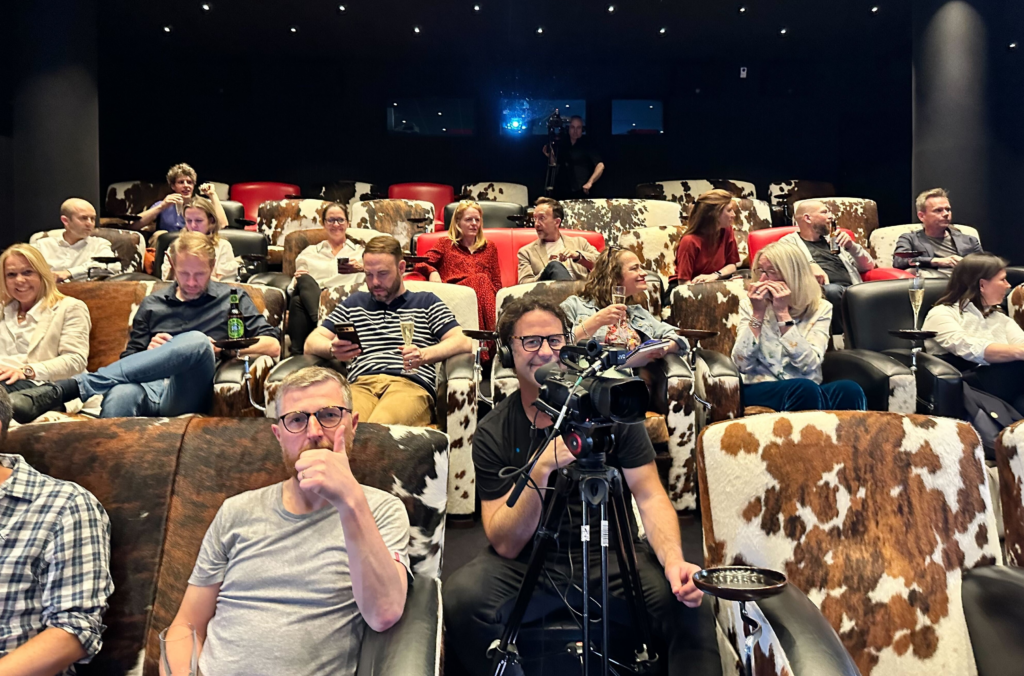Introduction
Although we, at The Forge, have been called a lot of things over the years by our clients, terrifying is, fortunately, a new one. But there is no better word for the way we all felt in the room last Wednesday night when ecological philosopher and green activist Rupert Read presented his deeply disturbing polemic, Out of the Ashes. On screen, he walked through snow and fire, to a backdrop of floating cars, devastated cities and burning wildlife. In person, he was equally captivating. Yet, despite the terror, (or perhaps because of it) our clients who were there told us that the evening had been transformative and inspirational.
“I’ve worked in sustainability for 13+ years and I’ve been to many of these types of events. I feel like I hear the same thing each time… however at this event I heard perspectives I’ve not experienced before and I’ve thought in ways I’ve not thought of before. The diversity of thinking was brilliant – thank you.”
Nicola Mclaren, Global Insights Director for Sustainability, Haleon
Rupert was part of the stellar panel for the event, which was chaired by Simon Garnett from The Forge and included Charmian Love, who helped to found B Lab UK and is now Director of Advocacy at the world’s biggest B Corp, Natura&Co, and Hannah Robinson, an activist and member of Force of Nature, a platform helping young people turn climate anxiety into action. Hannah is also a member of Generation Z and represented young people on the panel.

Facing the feelings
Rupert’s message was simultaneously stark and encouraging and, as such, embodied a key theme for the evening: where is the balance between being positive and negative about the task ahead of us? He argued that we mustn’t shy away from the reality of what is happening. The Doomsday Clock is currently set at 90 seconds to midnight – but Rupert says that this is misleading. From his conversations with leading climate experts and colleagues, he actually sets the clock at five past midnight and says we must accept now that there will be serious environmental consequences. It is OK to be frightened. It is OK to be angry. We need to accept those feelings and use them to galvanise us and stimulate action. He quoted poet Friedrich Hölderlin, “But where the danger is, also grows the saving power.”
Rupert called for a Churchillian response to the climate crisis, saying that our wartime leader didn’t sugar coat the trials ahead, offering only blood, toil, sweat and tears. This comparison with the war led to one of the most striking and moving slides in his presentation deck. The slide was blank. But Rupert asked us all to think about the children in our lives and how we might respond, at some point in our future, when they ask us ‘when the forests were burning, what did you do?’
“The ashes are now inevitable. What grows out of them is all to play for.”
Rupert Read

A force for good
The panel discussion that followed focused on the practicalities – what we, in the room, can do to make change. We acknowledge that we – every one of us present – has privilege and agency, working for brands or in marketing and insights. But can business be a force for good? If we qualify that and recognise that the force for good comes from people within businesses, then we must recognise that we are those people.
“Businesses are just collections of people. And I truly believe that people in businesses have the power, resources and money to be a powerful and important force for change.”
Hannah Robinson
The role of governance
Charmian spoke about the role of governance as the source of change – to the extent that she believes that we have the acronym ESG all wrong – it should start with the G for governance. She is a passionate advocate for the Better Business Act – the campaign to change subsection 172 of Companies Act 2006, removing the requirement for shareholder primacy and empowering directors to advance the interests of other stakeholders, wider society and the environment.
“Governance is the gateway to how decisions are made.”
Charmian Love
What is required from business is what Rupert called a ‘full spectrum response’ – one that looks at sustainability throughout the supply chain, the company’s products, pensions and investments, that considers its influence and lobbying power and reconsiders fiduciary duty, looking to the long-term health of the company, not just short-term shareholder returns.

And a role for marketing and insights
The discussion moved to look at what we, the marketers and insights professionals in the room, can do. Fortunately, we have a superpower: understanding what people want, need and feel, and translating that up into the C suite to influence business strategy.
“We’ve heard a lot about how to bring the voice of the consumer into the boardroom. Why are we doing that? So that decision makers can hear what people think. And with the insight experience in this room, this is something we can do better than anything.”
Simon Garnett
And businesses, ultimately, will listen to what people want. Already, some businesses are finding it harder to hire and retain young people, in particular – Hannah mentioned conscious quitting and the increasing proportion of people who would leave a job if the company’s values don’t align with their own and Rupert mentioned the announcement, freshly made in the press that morning, from students of top universities, pledging a “career boycott” of insurance firms supporting fossil projects. But it goes further. If (when) there is a critical mass of people behind the need to change, companies will have to follow. As marketers and insight professionals, not only do we have our ear to the ground and our finger on the pulse of consumer needs, but we also have the skills to shape that demand by helping businesses to see what is possible.
“We need to inspire a critical mass of people who are both willing and able to make these choices. And if that becomes the default, business will respond because it is good for them and governments will respond, because it is good for them. So, marketing and innovation has so much power, to my mind, because you can help to shape demand and create desire in a way that creates a more sustainable future.”
Alex Robinson, CEO, Hubbub

Finding a balance
Picking up again on the need to find the right balance between positivity and negativity, the discussion turned to how this should play out in our marketing and our messaging. If the job of marketing is to effect change, do we do so by scaring people or by encouraging them? If there is too much fear, people are likely to freeze and feel overwhelmed. But we must also be careful not to stray into toxic positivity and dampen down the reality of what is happening or fail to trust people to cope with the truth. Simon mentioned the book Humankind, by Rutger Bregman, which contests veneer theory – the idea that we are innately self-seeking and driven by egotistical goals – to make the point that humans can actually be trusted to hear the truth and act on it.
“It strikes me that so far, we have done a better job of branding the negative – five minutes past midnight and floating cars in China are incredibly powerful and clear images that get the message across. But when we think about the positive, we start talking about governance. And it just isn’t branded as powerfully and doesn’t come across as clearly. So as branding, marketing and insights people, how can we brand the positive messages so they are as impactful and inspiring as the negative ones?”
Jonathan Williams, ex-Founder, Discover.ai
Insights’ role in wider business strategy
What does that mean in a practical sense? One way to think about this is to consider an initiative that B Lab launched in the runup to COP 26, called ‘Boardroom 2030’ which encouraged business leaders to imagine what the board meeting in 2030 could be like, to ensure a more sustainable future. Who is on the board? What is on the agenda? And even, where could that meeting be?
“If you think about traditional board agendas, what are the people development issues, where are some of the big investments, what’s the strategy? Could, for example, citizens assemblies be a model for how you’d make decisions? What rules does a board member have to follow in 2030? What does it mean to be a going concern?”
Charmian Love

Closing thoughts
Simon thanked the panel and summarised the event by recommending another book, Citizens, by Jon Alexander. The book challenges us to move from a consumer story to a citizen story, where we don’t just make choices and consume but actively contribute to our futures. Simon talked about how this might play out for us in our roles as marketers and insights professionals – also inspired by a question from the audience on the Slido which asked, simply, “what can I do?”
“For me, I think, it comes back to GES. How do I as an insights person interact with that? If Governance is the unlock to systemic change, then we have an unrivalled opportunity to influence that. Who better than those of us in insight, to better understand people, beyond simply in their role as consumers, and translate that into meaningful strategies which help our organisations make the changes necessary to protect the future of our planet.”
Simon Garnett
Charmian then closed the event by highlighting the need for both an emotional and a practical response saying, “we must be guided by the science, but moved by the poetry” before reading the following, which is attributed to an unnamed Hopi Elder.
We offer these words to you as a powerful summary of our transformative evening, not to terrify, but to move you. We are the ones we’ve been waiting for…
————-
You have been telling the people that this is the Eleventh Hour, now you must go back and tell the people that this is the Hour. And there are things to be considered . . .
Where are you living?
What are you doing?
What are your relationships?
Are you in right relationship?
Where is your water?
Know your garden.
It is time to speak your Truth.
Create your community.
Be good to each other.
And do not look outside yourself for the leader.”
Then he clasped his hands together, smiled, and said, “This could be a good time! There is a river flowing now very fast. It is so great and swift that there are those who will be afraid. They will try to hold on to the shore. They will feel they are torn apart and will suffer greatly.
Know the river has its destination. The elders say we must let go of the shore, push off into the middle of the river, keep our eyes open, and our heads above water. And I say, see who is in there with you and celebrate. At this time in history, we are to take nothing personally, least of all ourselves. For the moment that we do, our spiritual growth and journey comes to a halt.
The time for the lone wolf is over. Gather yourselves! Banish the word struggle from you attitude and your vocabulary. All that we do now must be done in a sacred manner and in celebration.
We are the ones we’ve been waiting for.”
Attributed to an unnamed Hopi Elder
Hopi Nation
Oraibi, Arizona


